Premium Only Content

John Barleycorn Must Die Traffic
"John Barleycorn" is an English and Scottish folk song listed as number 164 in the Roud Folk Song Index. John Barleycorn, the song's protagonist, is a personification of barley and of the alcoholic beverages made from it: beer and whisky. In the song, he suffers indignities, attacks, and death that correspond to the various stages of barley cultivation, such as reaping and malting.
The song may have its origins in ancient English or Scottish folklore, with written evidence of the song dating it at least as far back as the Elizabethan era. The oldest versions are Scottish and include the Scots poem "Quhy Sowld Nocht Allane Honorit Be". In 1782, the Scottish poet Robert Burns published his own version of the song, which influenced subsequent versions.
The song survived into the twentieth century in the oral folk tradition, primarily in England, and many popular folk revival artists have recorded versions of the song. In most traditional versions, including the sixteenth century Scottish version entitled Alan-a-Maut, the plant's ill-treatment by humans and its re-emergence as beer to take its revenge are key themes.
In their notes to the Penguin Book of English Folk Songs (London, 1959), editors A. L. Lloyd and Ralph Vaughan Williams ponder whether the ballad is "an unusually coherent folklore survival" or "the creation of an antiquarian revivalist, which has passed into popular currency and become 'folklorised'". It has been theorised that the figure could have some relation to the semi-mythical wicker man ritual, which involves burning a man in effigy.
Kathleen Herbert draws a link between the mythical figure Beowa (a figure stemming from Anglo-Saxon paganism that appears in early Anglo-Saxon royal genealogies whose name means "barley") and the figure of John Barleycorn. Herbert says that Beowa and Barleycorn are one and the same, noting that the folksong details the suffering, death, and resurrection of Barleycorn, yet also celebrates the "reviving effects of drinking his blood".
The first song to personify Barley was called Allan-a-Maut ('Alan of the malt'), a Scottish song written prior to 1568; Allan is also the subject of "Quhy Sowld Nocht Allane Honorit Be", a fifteenth or sixteenth century Scots poem included in the Bannatyne Manuscript of 1568 and 17th century English broadsides.
The first mention of "John Barleycorn" as the character was in a 1624 London broadside entitled introduced as "A Pleasant New Ballad to sing Evening and morn, / Of the Bloody murder of Sir John Barley-corn".
Many field recordings of the song were made of traditional singers performing the song, mostly in England. In 1908, Percy Grainger used phonograph technology to record a Lincolnshire man named William Short singing the song; the recording can be heard on the British Library Sound Archive website. James Madison Carpenter recorded a fragment sung by a Harry Wiltshire of Wheald, Oxfordshire in the 1930s, which is available on the Vaughan Williams Memorial Library website as well as another version probably performed by a Charles Phelps of Avening, Gloucestershire. The Shropshire singer Fred Jordan was recorded singing a traditional version in the 1960s.
John Barleycorn Must Die is the fourth studio album by English rock band Traffic, released in 1970 as Island ILPS 9116 in the United Kingdom, United Artists UAS 5504 in the United States, and as Polydor 2334 013 in Canada. It marked the band's comeback after a brief disbandment, and peaked at number 5 on the Billboard 200, making it their highest-charting album in the US, and has been certified a gold record by the RIAA.
In late 1968, Traffic disbanded, with guitarist Dave Mason leaving the group for the second time prior to the completion of the Traffic album. In 1969, Steve Winwood joined the supergroup Blind Faith, while drummer and lyricist Jim Capaldi and woodwinds player Chris Wood turned to session work. Wood and Winwood also joined Blind Faith's drummer Ginger Baker in his post-Blind Faith group Ginger Baker's Air Force for their first album, Ginger Baker's Air Force (1970).
At the beginning of 1970, after the demise of Blind Faith, Winwood returned to the studio ostensibly to make his first solo album, originally to be titled Mad Shadows. He recorded two tracks with producer Guy Stevens, "Stranger to Himself" and "Every Mother's Son", but yearned for like-minded musicians to accompany, inviting Wood and Capaldi to join him. Thus Winwood's erstwhile solo album became the reunion of Traffic (minus Dave Mason), and a re-launch of the band's career. Mad Shadows would go on to be the title of Mott the Hoople's second album, also produced by Guy Stevens, and the new Winwood/Traffic album took its title from one of its tracks and became John Barleycorn Must Die.
The album featured influences from jazz and blues, but the version of the traditional English folk tune that provided the album's title, "John Barleycorn", also showed the musicians attending to a modern interpretation of traditional folk music in the vein of contemporary British bands Pentangle and Fairport Convention. Whereas previous Traffic albums had been dominated by more concise song structures, John Barleycorn saw the group develop into a looser, jam-oriented progressive rock and jazz fusion style, setting the tone for their subsequent output in the 1970s.
Traffic
John Barleycorn Must Die
(1970)
Steve Winwood (ish)
"John Barleycorn (Must Die)"
There were three men came out of the West
Their fortunes for to try
And these three men made a solemn vow
John Barleycorn must die
They've ploughed, they've sown, they've harrowed him in
Threw clods upon his head
And these three men made a solemn vow
John Barleycorn was dead
They've let him lie for a very long time
Till the rains from heaven did fall
And little Sir John sprung up his head
And so amazed them all
They've let him stand till midsummer's day
Till he looked both pale and wan
And little Sir John's grown a long, long beard
And so become a man
They've hired men with the scythes so sharp
To cut him off at the knee
They've rolled him and tied him by the waist
Serving him most barbarously
They've hired men with the sharp pitchforks
Who pricked him to the heart
And the loader he has served him worse than that
For he's bound him to the cart
They've wheeled him around and around the field
Till they came unto a barn
And there they made a solemn oath
On poor John Barleycorn
They've hired men with the crab-tree sticks
To cut him skin from bone
And the miller he has served him worse than that
For he's ground him between two stones
And little Sir John and the nut-brown bowl
And he's brandy in the glass
And little Sir John and the nut-brown bowl
Proved the strongest man at last
The huntsman, he can't hunt the fox
Nor so loudly to blow his horn
And the tinker he can't mend kettle nor pot
Without a little Barleycorn
-
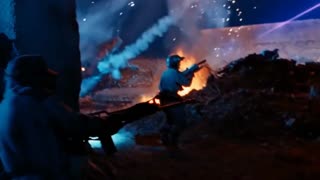 17:39
17:39
Psychological operations
11 days agoGot Me Under Pressure Waitin' For The Bus Jesus Just Left Chicago My Head's In Mississippi
581 -
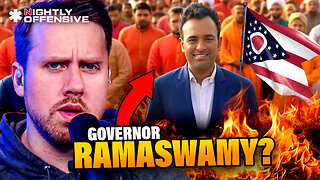
Slightly Offensive
10 hours ago $0.81 earnedGOV. RAMASWAMY? Vivek to import 1 BILLION INDIANS to OHIO | Nightly Offensive
76.2K17 -
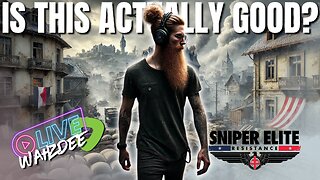 4:51:08
4:51:08
Wahzdee
13 hours agoSniper Elite Then Extraction Games—No Rage Challenge! 🎮🔥 - Tuesday Solos
97.1K3 -
 2:12:58
2:12:58
Robert Gouveia
12 hours agoSenator's Wife EXPOSED! Special Counsel ATTACKS; AP News BLOWN OUT
72.8K67 -
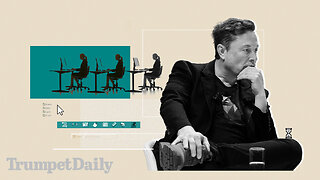 55:07
55:07
LFA TV
1 day agoDefending the Indefensible | TRUMPET DAILY 2.25.25 7PM
56.8K20 -
 6:09:26
6:09:26
Barry Cunningham
19 hours agoTRUMP DAILY BRIEFING - WATCH WHITE HOUSE PRESS CONFERENCE LIVE! EXECUTIVE ORDERS AND MORE!
164K50 -
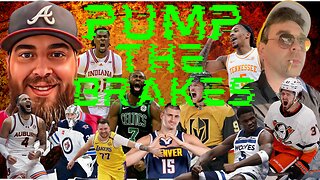 1:46:37
1:46:37
Game On!
14 hours ago $0.51 earnedPUMP THE BRAKES! Checking Today's Sports Betting Lines!
92.1K3 -
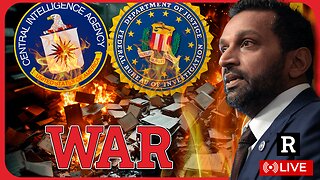 1:27:21
1:27:21
Redacted News
13 hours agoBREAKING! SOMETHING BIG IS HAPPENING AT THE CIA AND FBI RIGHT NOW, AS KASH PATEL CLEANS HOUSE
236K245 -
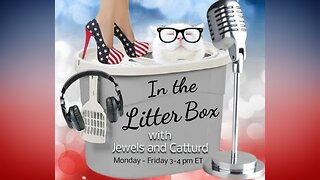 1:08:28
1:08:28
In The Litter Box w/ Jewels & Catturd
1 day agoCrenshaw Threatens Tucker | In the Litter Box w/ Jewels & Catturd – Ep. 749 – 2/25/2025
140K64 -
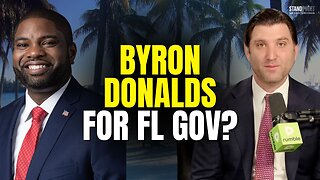 44:57
44:57
Standpoint with Gabe Groisman
1 day agoWill Byron Donalds Run for Florida Governor? With Congressman Byron Donalds
60.8K9